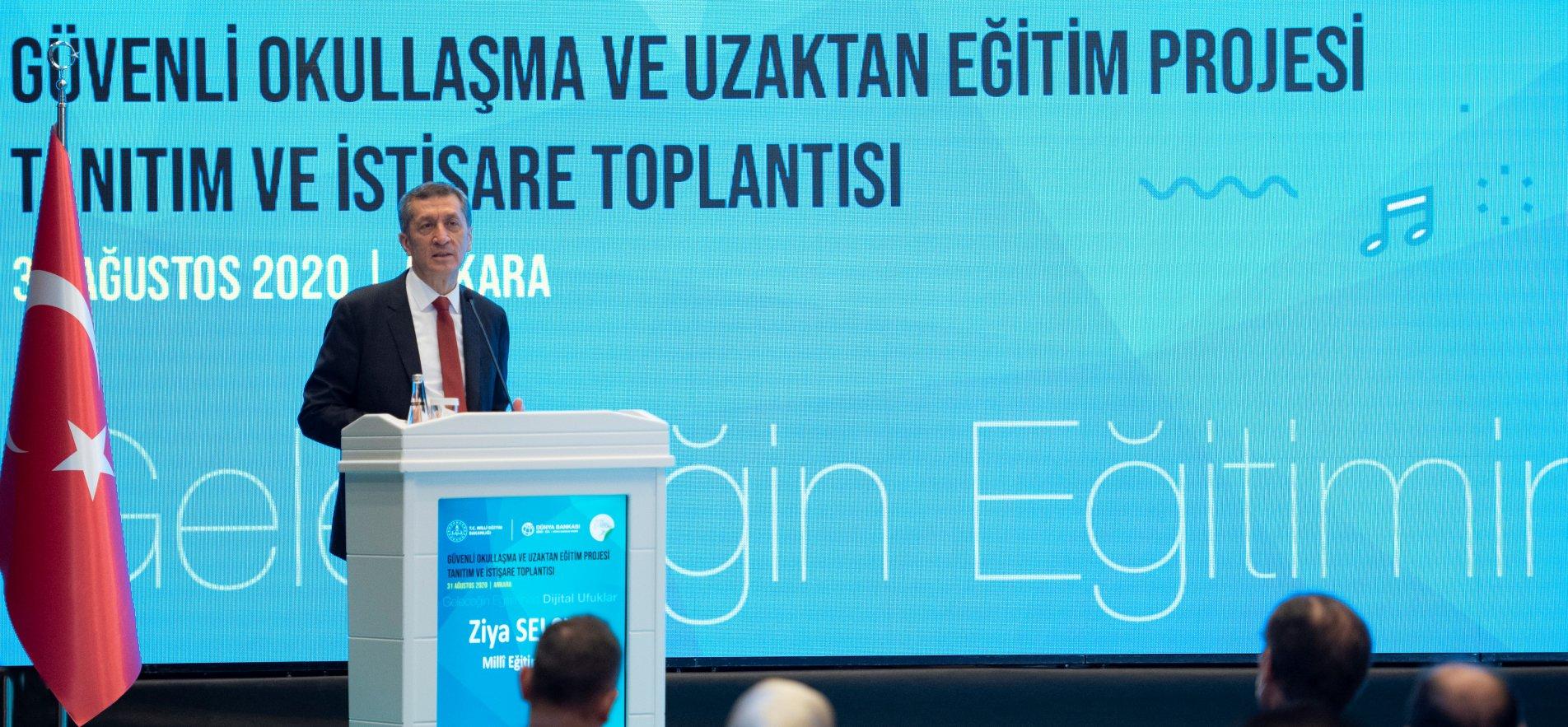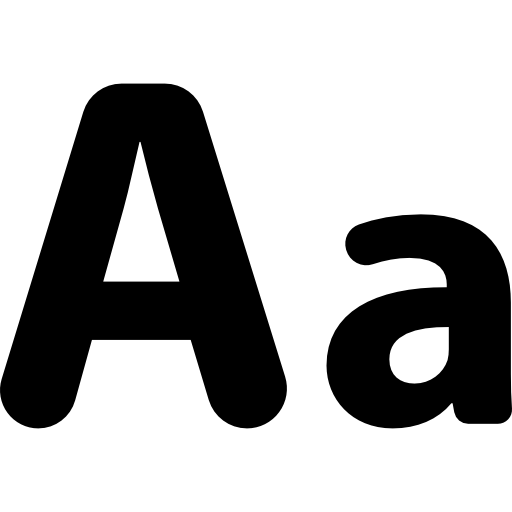
Minister of National Education Ziya Selçuk attended the 160 million dollar budget "Ministry of National Education (MEB) - the World Bank Safe Schooling and Distance Education Project" Consultation Meeting. Noting that his Ministry is determined to consider education with all of its components by maintaining association with the global processes during the Covid-19 pandemic, Minister of National Education Ziya Selçuk said that 2023 Education Vision of the Ministry ado Q pted an innovative point of view that considers transformations in the world and encourages building a future together by trying to understand what future holds for the globe. Reminding that goals about distance education was already set in the vision before the beginning of the pandemic, Selçuk stated that the importance of distance education and blended education were emphasized especially in the Secondary Education Draft. "However, the pandemic turned out to be the reason to carry our existing capacity and projects to a higher level," said Selçuk, "during this period, we had the opportunity to capture the spirit of time and conditions of our era."
Instant live lecture capacity of EBA reached 1 million
Selçuk pointed out that online live lecture and EBA platform capacity which was approximately 40 thousand students at the beginning of distance education currently reached 1 million students. Concerning the project which was funded by the World Bank, Selçuk said, "We had needs for the reinforcement of components of the existing EBA system, for increasing its capacity and taking measures for the future and we initiated this project in order to respond these needs. This day can be defined as the day when Mr. President signed this project and the day when the Ministry of National Education initiated this project."
Underling that there are two important sides of this project, Ziya Selçuk said, "First is about increasing the quality of education during the pandemic and assisting quick access to education platforms. Second is how the Turkish education system would reach this blended, hybrid approach in the aftermath of the pandemic. Within this framework, digital infrastructure of the education system will be reinforced both during and in the aftermath of the pandemic." Minister Selçuk stated that distance education will make contributions not only for students but also for teachers.
"We have dreams about how to walk the path ahead of us"
Concerning distance education and the project, Selçuk said, "Upcoming period shows us that distance education will be about blended model and we will reach a higher level in terms of online live lectures. It is very clear." Noting that there is the labor of a successful team behind the project, Selçuk went on to say that, "I would like to thank the Ministry of Treasury and Finance. We have achieved a nice team work within a very short period of time in order to begin the project as soon as possible. I would like to thank the World Bank because they approved the project in the shortest time possible. There is a path ahead of us and we have dreams about how to walk this path. We wish to design a very special platform and use the resources of this project in the most functional way in order to make an impact for improving the quality of education."
Selçuk noted that experts and scientists will work in cooperation with the teams from the Ministry and added: "This project is not only limited with technical infrastructure, it is also about education contents, training of teachers, follow up and assessment activities and capacity improvement. There are many parameters. We will work together in order to reach the optimal outcome, manage the process in the most effective way and display a clear path under the direction of science. I believe that this projective will be very productive."
World Bank Turkey Country Director Praises Turkey
Meanwhile, the World Bank Turkey Country Director Auguste Tano Kouame attended the meeting through video conference. Noting that the new type of coronavirus (Covid-19) pandemic affected more than 160 countries and schools were closed for more than 1 billion students, Kouame said countries urgently carried out various different projects in an effort to adapt their education systems to the new conditions and gradually started to use distance education. Kouame underlined that only a few countries have showed their full potential until now and many countries used distance education and computer supported education for supporting traditional education systems and for the first time they are using this system for all students from pre-school to 12th grade.
Kouame stated, "Within this framework, we would like to congratulate Turkey for being among the first countries which took digital and other measures in the early stages of the pandemic in order to maintain the education process in the middle of this unprecedented crisis. Risk management approach that the Ministry of National Education displayed in distance education and its response to Covid-19 crisis was both unique and praiseworthy." Noting that the "Safe Schooling and Distance Education Project" will reduce the potential learning loss that may emerge due to long recess at schools because of Covid-19 pandemic into minimum and also lay the foundation for stronger learning in the future, Kouame said, "the Project deserves appraisal as it focuses on providing equal accession opportunity to distance education from all parts of the country and for all families having different incomes and strongly supports inclusive learning."
Kouame stated that the Project represents a first for the World Bank in many aspects adding that, "It is the first project that was implemented in an effort to reduce the impact of Covid-19 on education system. It is the first project that aimed at using digital technology in large scale for the development of the existing education systems. It is the first project where we used experiences that we had attained from activities for the reinforcement of infrastructure resistance for urgent situations like a pandemic. This project will also play a complementary role for the "Reinforcement of Education Infrastructure in Turkey" which is implemented by the Ministry of National Education and financed by the World Bank and "the Disaster Risk Management in Schools Project".
"No other project was prepared and approved this fast"
Director General of Innovation and Education Technologies Anıl Yılmaz gave information about the distance education process in Turkey and the project which will be carried out in cooperation with the World Bank. Noting that project preparation activities began in March and the project proposal was completed in the beginning of June, Yılmaz said, "Actually, this can be considered as a record when we compare with other past projects of the World Bank. No other project was prepared and approved this fast. As a result of consultations with our country and the World Bank, credit agreement process and approval of Mr. President, we have reached this point."
Yılmaz stated that the project will continue until December 2023 but many expected outcomes of the project will be achieved within a very short period of time and added, "Total budget of the project is 160 million dollars. It will be carried out with 100 percent foreign funding."
Naming three main components of the Project, Yılmaz said that the first component of the project is to increase the education infrastructure capacity. Yılmaz explained that as a part of the first component, urgent needs will be responded during the pandemic process and blended education system will be established after the beginning of face to face education. In other words, this system will blend formal education with the distance education.
Yılmaz said that the second component is about digital contents for distance education and its sustainable ecosystem and the last system is about corporate capacity. Noting that instant EBA platform capacity varies between 750 thousand and 1 million, Yılmaz said, "We are aiming at establishing a system which will serve up to 5 million users in 2023."
Yılmaz added that their goal is to increase the percentage of students using EBA more than one hour within a week to 70 percent in 2023 and rate of students living in regional poverty zones to 30 percent and increase the number of teachers who complete distance training and provide certificates to 900 thousand.





























